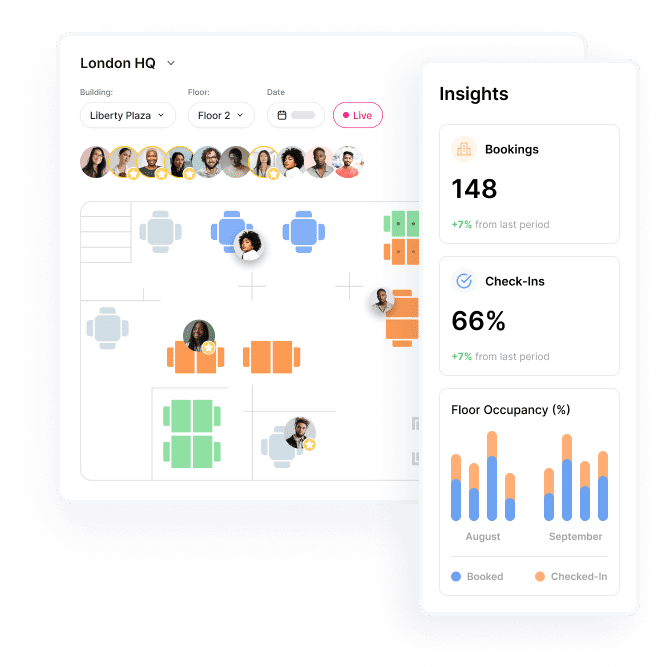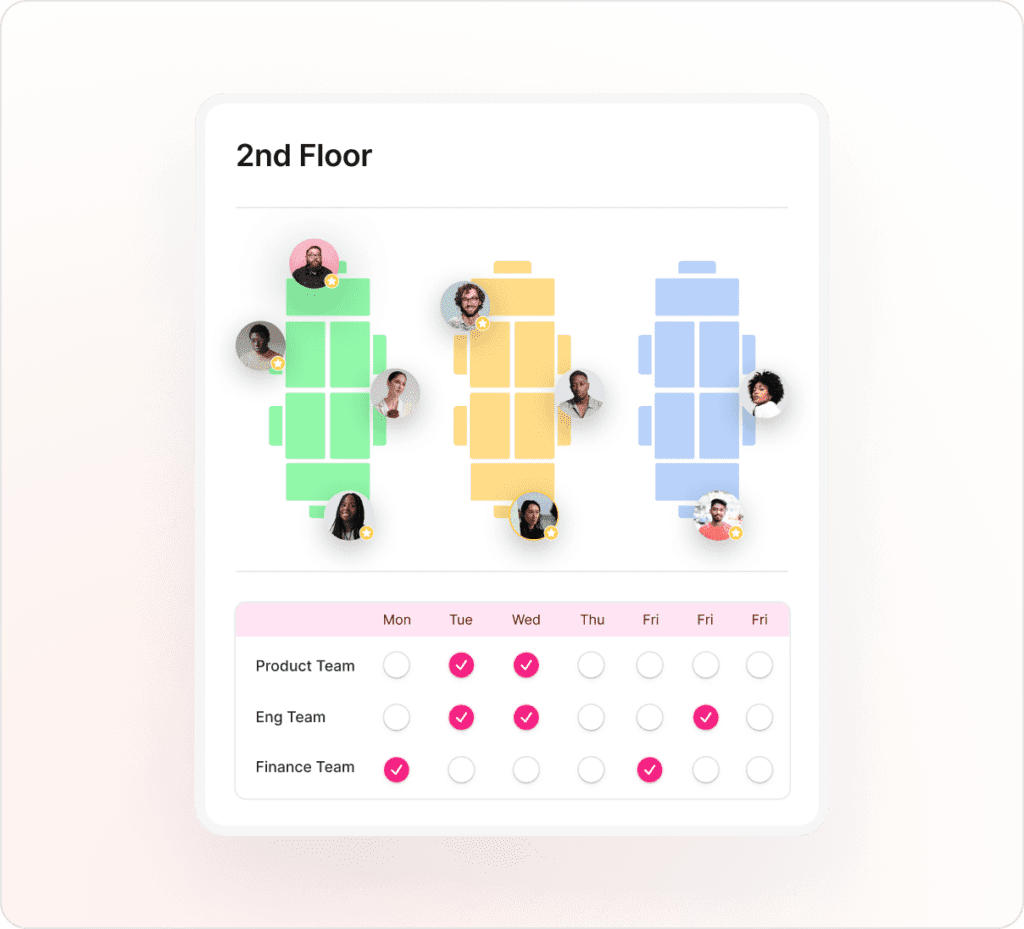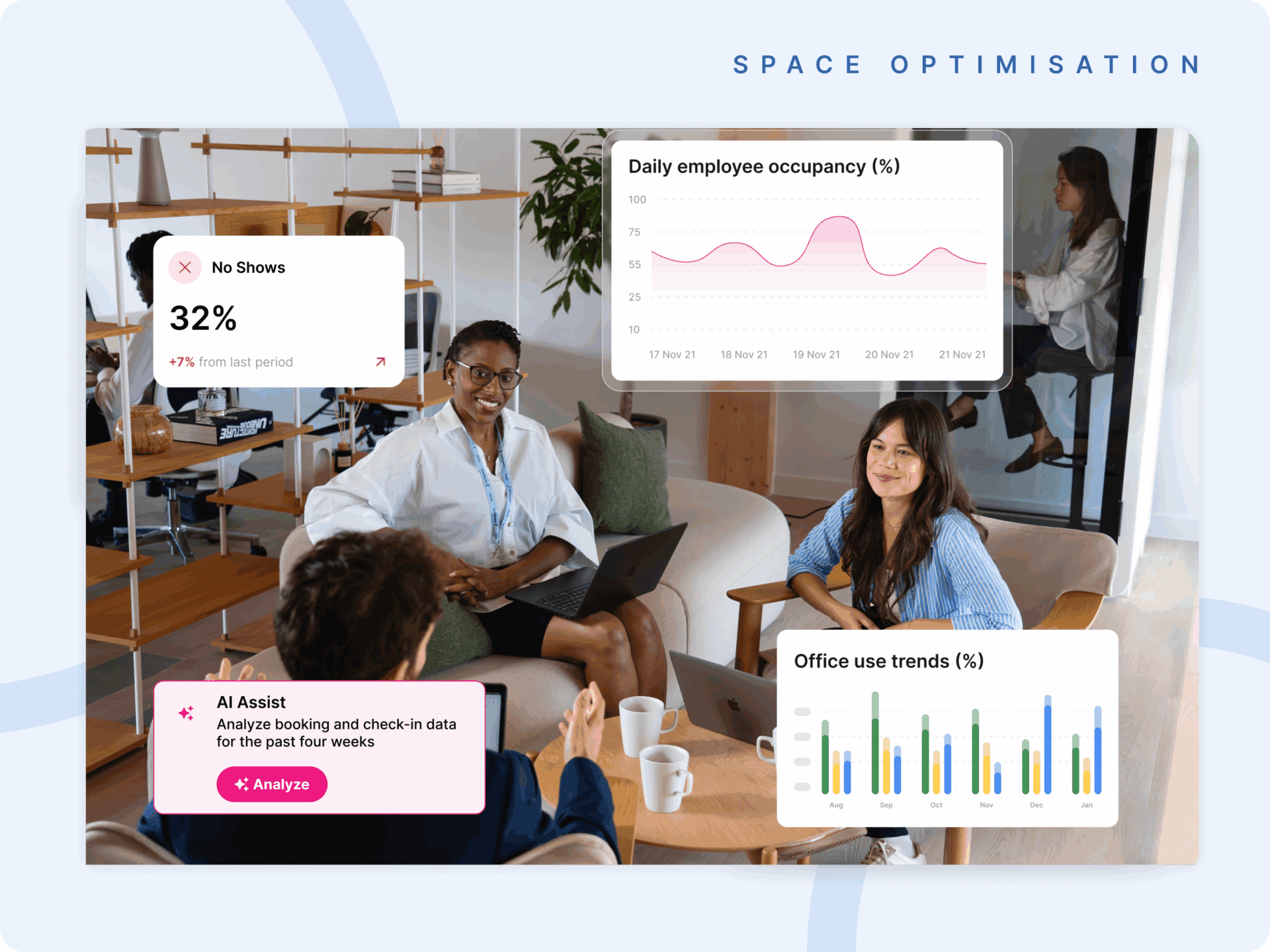The rise of hybrid work models has defined what we think of as the modern workplace. As companies adapt to this new normal, the need for effective space management tools has become critical. These tools can have a transformative impact on the hybrid work environment, enhancing:
- productivity
- collaboration
- overall employee well-being
Embracing the Hybrid Work Revolution
The traditional 9-to-5 office routine has given way to a more flexible and dynamic work model. This revolutionary shift allows employees to blend remote work with in-office collaboration. Employees can now strike a balance that accommodates both professional and personal needs.
With this newfound flexibility comes the challenge of optimizing workspace utilization. That’s where space management tools come into play. Organizations must first grasp the intricacies of their workspace dynamics. Space management tools empower businesses to gain insights into how their spaces are utilized. Analytics provide a thorough overview of office occupancy, meeting room usage, and individual work patterns. This knowledge becomes the cornerstone for strategic decision-making. Companies can create an environment tailored to their unique needs.

Boosting Productivity through Smart Space Allocation
There is correlation between a well-organized workspace and increased productivity. Space management tools enable companies to optimize their office layout. Managers can ensure that the available space aligns with the nature of the tasks at hand. Whether it’s collaborative zones for team projects or quiet corners for focused individual work.
With the space personalized for the team’s needs, productivity increases. The right space management tools will help managers allocate neighborhoods for teams. Employees can effectively and easily collaborate when the space is designed for their needs.

Creating Agile Workspaces
Adaptability is key. Space management tools facilitate the creation of agile workspaces. These can be easily reconfigured based on evolving needs. Tools can recommend suitable desks or meeting rooms equipped with the necessary technology and resources.
With no more fixed desks, employees need to be able to book desks that meet the requirements for their tasks. This can be impossible to provide without space management tools. Otherwise, managers rely on unreliable spreadsheets to track what facilities are available.
Prioritizing Employee Well-being
Effective space management creates an environment that prioritizes the well-being of employees. The space where work happens is integral to the happiness of the team. It’s as simple as saying when employees are comfortable, they feel better working.
Employees may use the tools to reserve office spaces when they need a break from the isolation of remote work. This flexibility promotes a healthier work-life balance. Employees can choose the environment that best suits their tasks and preferences. And this autonomy to book when they like through their device empowers them.
Enhancing User Experience
Sometimes, it’s easy to forget the human aspect of technology. Space management tools are not just about data and analytics. They are tools designed to enhance the overall user experience.
When choosing software, look out for a well-designed, intuitive user interface. Employees should be able to effortlessly navigate and leverage the features of these tools. If they can, booking a desk no longer becomes a task in itself.
Not everyone is a tech expert. Space management tools come with comprehensive training and support features. Employees at all levels can harness the full potential of these tools. This takes off pressure for managers to set up outdated systems using spreadsheets and train their staff.
Look out for AI integration. Instead of even having to learn how to use the software, employees can request what they need in a simple message. The AI will do the rest and respond in the same conversational manner.

Scalability and Customization
Space management tools future-proof the work environment. They are a strategic investment that enable organizations to adapt and stay ahead of the curve.
Their power lies in their scalability and customization options. Organizations can tailor these tools to fit their unique requirements. The same tools can be used as the company grows – from startup to operating on a global scale.
The tools adapt to the size of the company, rather than the other way around. They work with the space you have and will adapt as your company grows or downsizes.
Integrations with Preexisting Software
Space management tools should not be isolated entities. They should seamlessly coexist with any software that your team is already using. Whether that be Microsoft Teams or Slack, the space management tool should be able accessible within this software.
This saves employees having to jump from app to app. Desks and meeting rooms can be booked within the software they are already familiar with.
Managers should also have the capability to export reports about how the space is being used. This can be shared within internal communications, so decisions based on the data can be easily made.
Consider Kadence to Navigate Hybrid with Confidence
Space management tools are undeniably transformative. These tools go beyond optimizing physical spaces. They create a holistic work environment that prioritizes productivity, collaboration, and employee well-being.
Kadence’s space management tools can empower your company in its hybrid journey. Book desks and conference rooms, invite visitors and coordinate your team’s movements.
Kadence gives you detailed insights into how your team uses office space. Reports explain what spaces are under-used, so you can save on real estate costs. With Kadence, you not only manage the space, but ensure it achieves its full potential.
Book a demo today. We’ll show you exactly how Kadence can help you find your rhythm for work.




